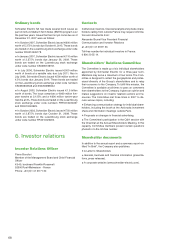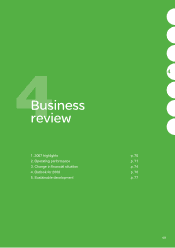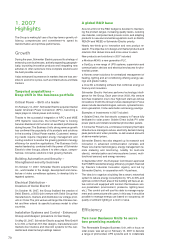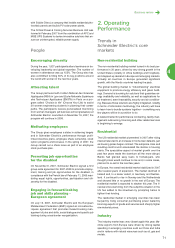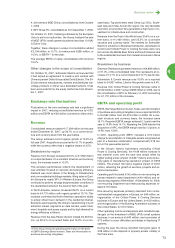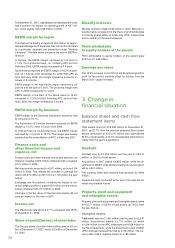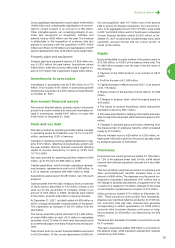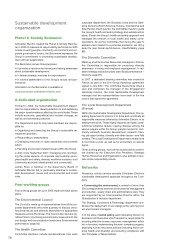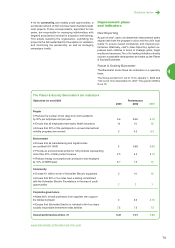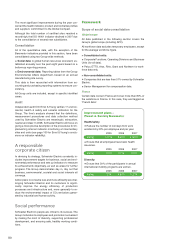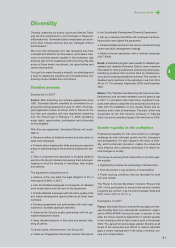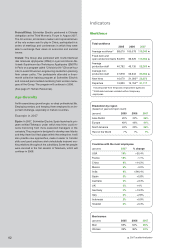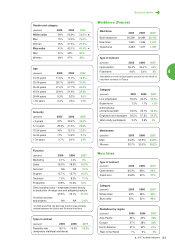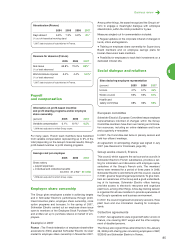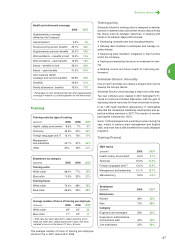APC 2007 Annual Report Download - page 80
Download and view the complete annual report
Please find page 80 of the 2007 APC annual report below. You can navigate through the pages in the report by either clicking on the pages listed below, or by using the keyword search tool below to find specific information within the annual report.78
Sustainable development
organization
Planet & Society Barometer
Schneider Electric created the Planet & Society Barome-
ter in 2005 to measure its responsibility performance. With
criteria covering people, community, environment and cor-
porate governance issues, the Barometer expresses the
Group’s commitment to promoting sustainable develop-
ment with all stakeholders.
The Barometer serves three purposes:
It provides a resource for training and raising awareness
about sustainable development.
It defines strategic avenues for improvement.
It informs stakeholders of the Group’s results and per-
formance.
Information on the Barometer is available at:
www.barometer.schneider-electric.com
A dedicated organization
Formed in 2002, the Sustainable Development Depart-
ment is responsible for drawing attention to and explaining
the major transformations affecting the world today. These
include economic, geopolitical and societal changes, as
well as environmental protection.
The Department and its sixty team members are respon-
sible for:
Organizing and executing the Group’s sustainable de-
velopment priorities.
Responding to stakeholders.
Deploying resources to raise awareness and promote
action.
Handling environment-related issues within the Group.
And, since September 2007, managing and coordinat-
ing the social aspects of corporate responsibility (work-
place health and safety, diversity, workforce inclusion, host
community economic development and community).
James Ross, a member of the Supervisory Board of
Schneider Electric SA, is particularly attentive to sustain-
able development issues and environmental and social
risks.
Four working groups
Four working groups set up in 2005 impel and track action
plans.
The Environmental Council
The Council is made up of representatives from all the cor-
porate departments who meet quarterly to discuss cross-
functional issues and promote deployment of appropriate
measures across the Group. The Council also devotes sig-
nificant time to monitoring environmental issues at both the
eco-design and eco-production levels (see Environmental
performance, page 92).
The Health Committee
Committee members include representatives from each
corporate department, the Business Units and the Oper-
ating Divisions (North America, Europe, International and
Asia-Pacific). Each quarter, the Committee meets to guide
the Group’s health and safety strategy and validate action
plans. It leads the Group’s health and safety approach and
manages the network of local health and safety corre-
spondents. An ad hoc committee met during the year to
address risks related to a potential pandemic set off by
avian flu (see Social performance– Health/Safety, page
86).
The Diversity Committee
Made up of all the Human Resources managers in France,
this Committee is responsible for promoting diversity
awareness in hiring and employee management. It vali-
dates strategy and action plans (see Social performance –
Diversity, page 81).
In 2007, a dedicated steering committee was created in
France as part of the first Group Handicap agreement
signed in July 2007. The committee meets three times a
year and comprises the manager of the
Engagement
Handicap
mission, the local Sustainable Development
manager and two representatives from each of the five
unions that signed the agreement.
The Local Development Department
(France)
Within the Sustainable Development Department, this op-
erating department’s mission is to drive and coordinate all
responsible measures initiated by Schneider Electric in its
employment pools. These highly regional yet highly cross-
functional initiatives require ongoing dialogue among the
various players within the Group–people involved in com-
munity outreach, business development, research, train-
ing, job opportunities, diversity and other issues—and field
workers. The Local Development Department meets three
to four times a year, as well as for encounters on special
topics.
Other working groups, such as the social policies commit-
tee chaired by the Executive Vice President, Strategic
Human Resources and Organization, also address corpo-
rate social responsibility issues.
Networks
Numerous culture carriers cascade Schneider Electric’s
sustainable development approach throughout the Com-
pany.
Concerning the environment, a network of more than
200 correspondents oversees environmental management
at production, supply chain and administrative sites. They
are supported by an Environmental Director within the
Globalization & Industry department.
The Strategy, Customers & Technology department coor-
dinates the deployment of eco-design policy among prod-
uct environment managers.
In the area of social policy, each Operating Division or
Business Unit Executive Vice President is responsible for
ensuring effective human resources management within
his or her area, implementing the new2company program,
deploying human resources policies (including those cov-
ering health and diversity) and ensuring compliance with
Our Principles of Responsibility.


